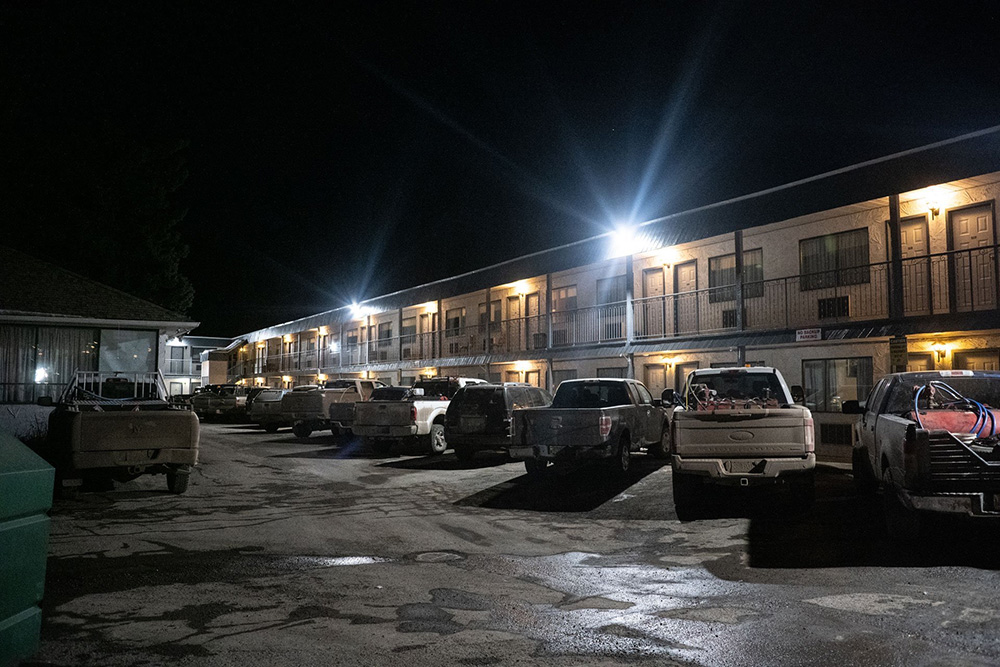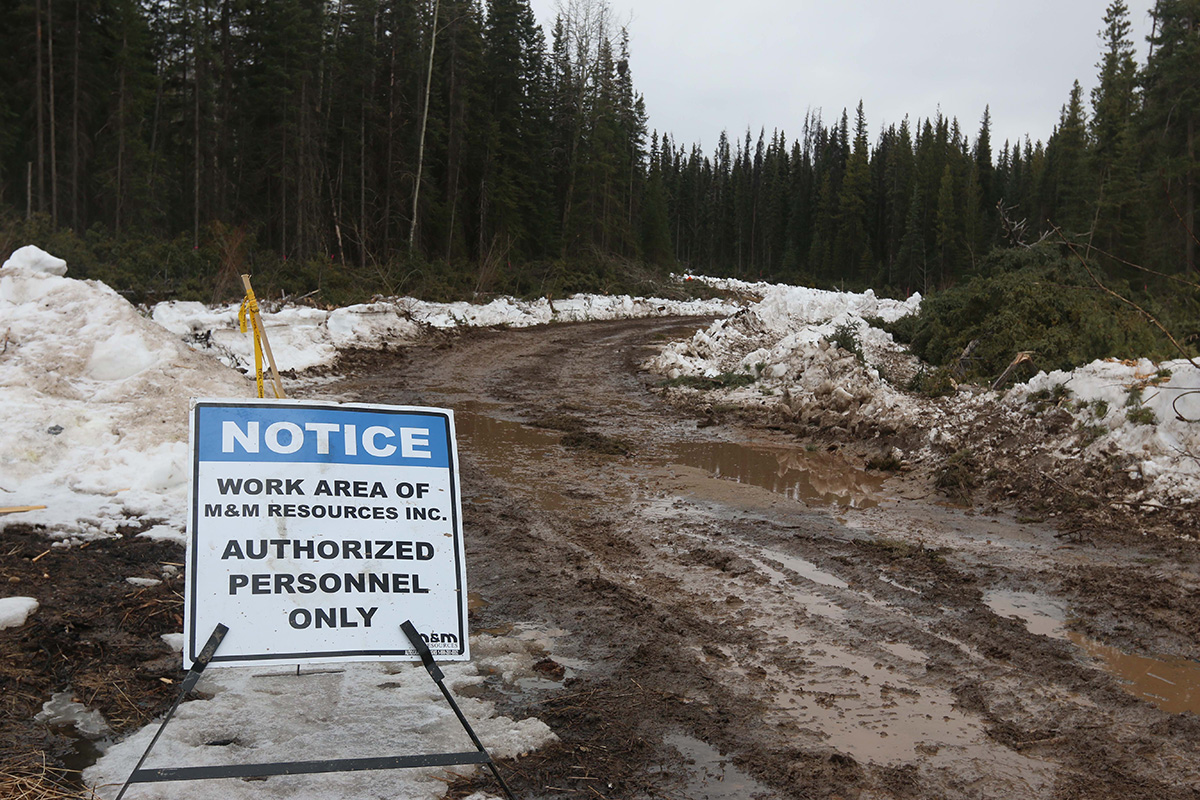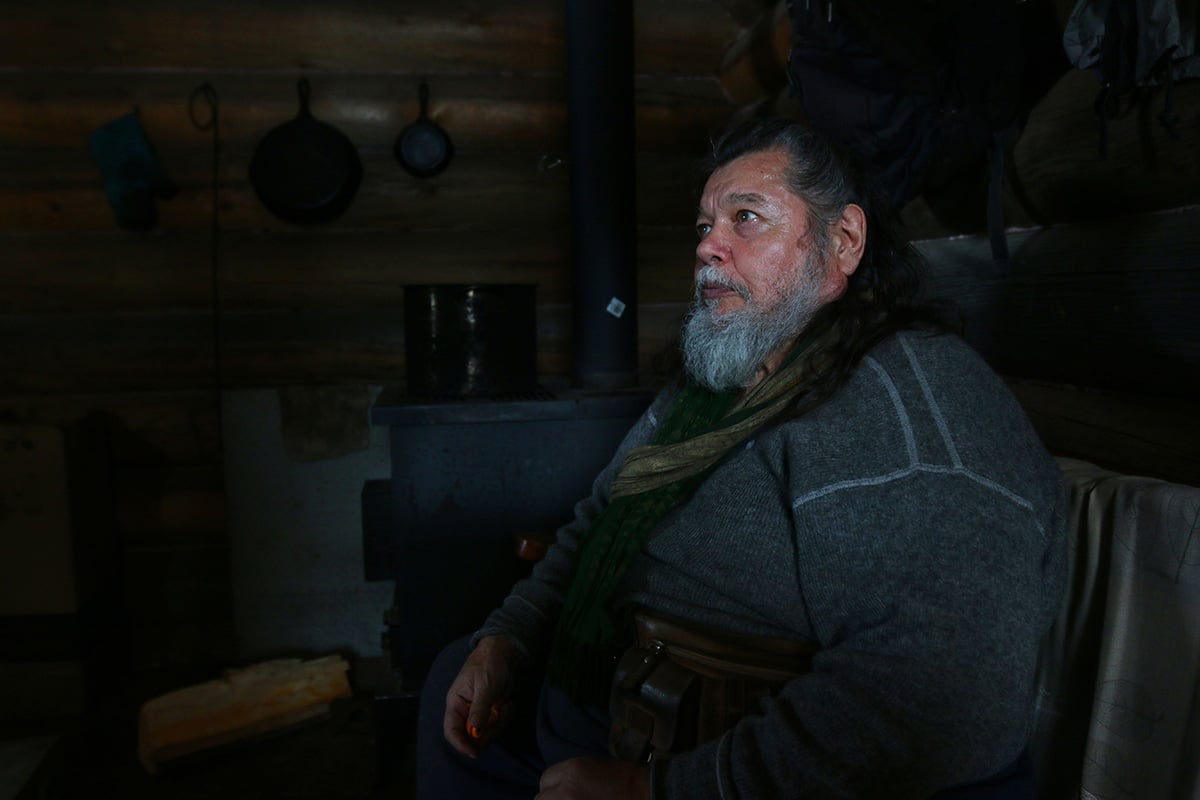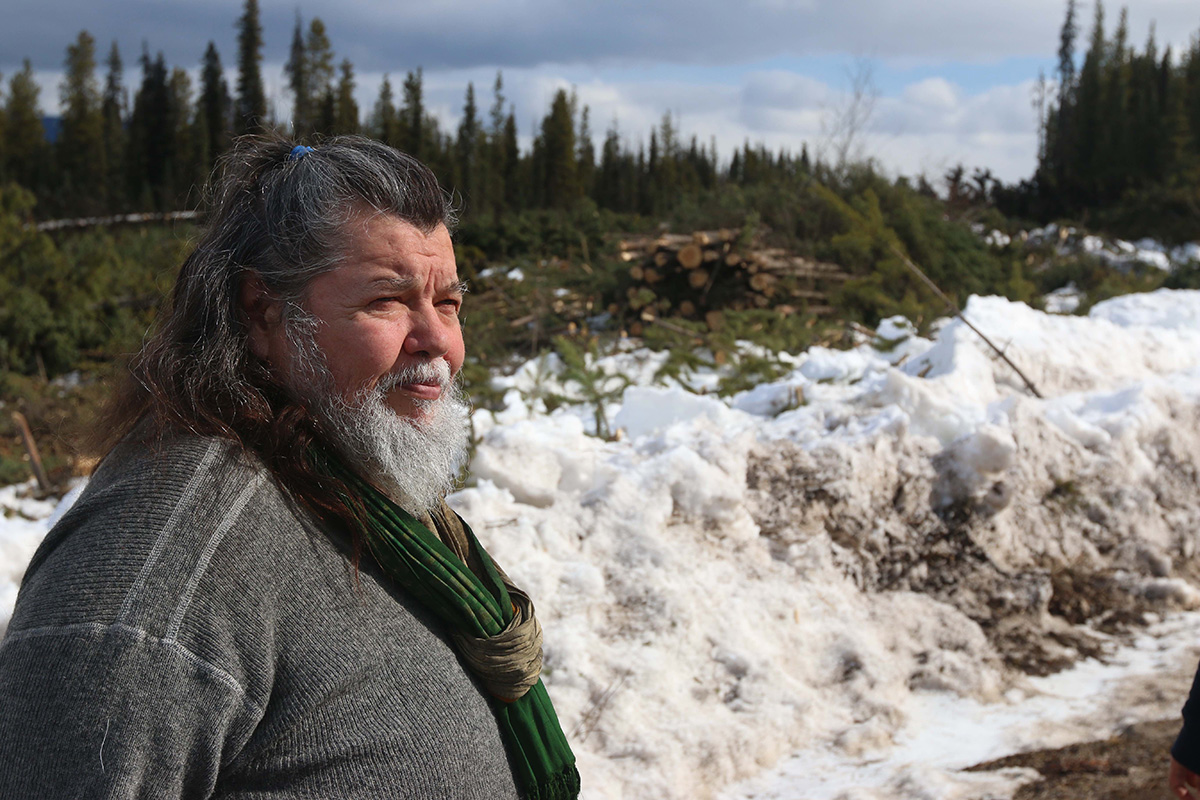Chief Dsta’Hyl steers his pickup off Highway 16 and heads south onto Buck Flats Road. Spring temperatures are quickly melting the thick blanket of snow in northern B.C. and the winding stretch of gravel road is slick with mud and ice.
The Wet’suwet’en hereditary chief does the drive from his home in Witset, 100 kilometres to the west, every three or four days. He monitors work on the Coastal GasLink pipeline and reminds workers and the RCMP they’re not welcome.
“We have to keep telling CGL they’re trespassing on our territory,” says Dsta’Hyl, whose English name is Adam Gagnon. “But they keep coming back.”
There is growing pressure to see that change.
On Monday, the Union of BC Indian Chiefs released an open letter to Premier John Horgan, Prime Minister Justin Trudeau and federal and provincial health ministers to reconsider “overbroad classifications of ‘essential services’ that allow the work to continue” along the pipeline route.
The letter urges officials to tell Coastal GasLink to stay home to slow the transmission of COVID-19.
“Most vulnerable to the spread will be frontline health-care workers, project workers, and local Indigenous and non-Indigenous communities forced to shoulder the consequences for any disregard for health and safety,” it says.
“Corporate exceptionalism cannot become a pandemic response strategy for the governments of B.C. and Canada.... We urge you to tell Coastal GasLink to stay home.”
Wet’suwet’en hereditary chiefs have already called on TC Energy, the company building the $6.2-billion pipeline, to leave their territory. They issued an eviction notice on Jan. 4, saying the project was damaging their territory and violated their rights.
The COVID-19 pandemic has added a new risk — fears that the hundreds of workers travelling in and out of the territory could bring the virus into communities.
“Yeah, we are concerned, but there’s not a lot we can do about it,” says Dsta’Hyl. The company announced last week it has scaled back its workforce along the 670-kilometre route.
Dsta’Hyl says he’s seen no evidence of the reductions.
Across B.C., businesses have closed, restaurants have been reduced to takeout only, schools are shut down indefinitely, employees are asked to work from home and gatherings of more than 50 people are forbidden.
But construction sites and work camps are not included in the 50-person rule. While projects like Site C and LNG Canada’s Kitimat plant are scaling back operations, work camps in the north continue to host hundreds of people and there are fears that an outbreak could overwhelm rural health-care facilities.
Provincial health officer Dr. Bonnie Henry said construction projects are different.
“Those work camps are where people are living and working, and we have given direction about the measures that need to be in place to protect people in those environments,” she said, pointing to enhanced cleaning and monitoring and adequate space to reduce crowding.
“Guidance has been provided and will continue to be provided and I’ll note that WorkSafeBC has been helpful in some of these areas, as well in giving some very direct advice on how to maintain these in a way that is safe.”
On Monday, the province released COVID-19 guidelines for industrial camps. The document includes advice on physical distancing, isolating workers displaying symptoms and when to seek medical help.
Nothing has stopped pipeline
The Coastal GasLink pipeline will carry gas from the province’s northeast to LNG Canada’s plant in Kitimat. While 20 elected band councils have signed agreements with the company, Wet’suwet’en hereditary chiefs have been firm in their opposition.
They’ve battled the project in the courts and on the land. In January 2019, RCMP officers forcibly removed barricades on the Morice West Forest Service Road erected by members of the Gidimt’en clan to block pipeline workers. The RCMP established a remote Community Industry Safety Office to conduct regular patrols on the forestry road.
Work on the pipeline route continued throughout 2019. In late December, the BC Supreme Court granted an injunction prohibiting anyone from restricting the company’s access to the pipeline route. On Jan. 4, Wet’suwet’en chiefs responded by evicting pipeline workers and closing the road. The standoff ended when RCMP cleared the route and arrested 28 people over five days in early February, allowing workers back into the area.
Now it appears not even a global pandemic can stop the pipeline.
Concerns about workers bringing virus into the north
In Houston, about a kilometre east of Buck Flats Road, hotel parking lots are filled with industry vehicles and rooms are occupied by workers from outside the region.
RCMP officers who rotate in and out from across the province continue to patrol the area, although they are now based at the Houston detachment.
Locals fear that the rotating shifts of RCMP officers and camp workers could bring the virus to the region.

The majority of pipeline workers are believed to be from outside the province. Last April, Liberal MLA Mike de Jong released a document that revealed LNG Canada expects about 35 per cent of its workforce to be from B.C.
Dsta’Hyl says that’s consistent with his personal experience. After hereditary chiefs evicted Coastal GasLink in January, he accompanied workers as they winterized a work camp on the Morice forestry road being built to house up to 450 workers. He said none of the 10 workers at the site were from the area.
“I was asking them individually where they were from and all of them were from somewhere else,” he says, including Alberta, the East Coast and France. The single B.C. resident was from Vancouver Island.
TC Energy declined a request for comment and instead directed The Tyee to its website.
On Thursday, the company posted an update stating that the number of pipeline workers had been scaled back “over the past few weeks” to approximately 400 by March 20.
An earlier report on the company’s website March 17 estimated 1,130 people were working on the pipeline route at the end of February.
It noted that the numbers are subject to change during spring thaw, when heavy machinery cannot be used in some areas.
“With spring breakup around the corner, we expect a significantly slighter workforce to be onsite to perform critical tasks, such as ensuring environmental conditions are met, before resuming clearing and beginning pipe installation this summer,” the website says in its March 17 update.
“Our teams will continue to monitor the COVID-19 situation closely and consult with appropriate health and government authorities before re-commencement of construction, to ensure the safety and health of our workforce, our local Indigenous partners and local communities.”
The pipeline is ‘biggest risk we’ve got right now’
From his home in Hagwilget Village, one of several First Nation communities in the area on self-imposed lockdown, Wet’suwet’en Hereditary Chief Na’Moks says the company’s numbers don’t add up.
“I don’t trust their numbers at all. According to the people out there, they said they don’t see a decrease,” he says. “When I talk to the people I know in Houston, they said, ‘Just look at the parking lots of the motels.’ Even with people staying out at the camp, the parking lot’s still full of company vehicles.”

Na’Moks says he’s concerned about the flow of workers and police officers to and from the region.
“That’s the biggest risk we’ve got right now — people flying from out of town into here, working, then taking off again,” he says. “Everybody else, nobody’s travelling or getting into big crowds and yet they are the ones putting us most at risk.”
As of Monday, Northern Health has reported 14 of the province’s 970 confirmed cases of COVID-19. The province hasn’t shared exact locations of cases in northern B.C.
In an open letter to Henry, David Bowering, former chief medical health officer for Northern Health, asked the province to share locations of positive cases in the north and “immediately shut down” industrial work camps.
“When I was practising as a medical health officer, which is now seven or eight years ago, we were already recognizing that we didn’t have the capacity — not even close — to provide occupational health services to these resource extraction companies,” says Bowering, who lives in Hazelton.
“My concern is that they do impact the local community. One is the local community contact — the inevitable contact between travelling workers in and out of the camps and local people or local services,” he says.
He adds that he also worries about the health of the workers.
“Their health is a concern and so is the health of their communities when they go home. The unfortunate nature of the virus is you can be infectious when you’re asymptomatic or even mildly symptomatic.”
Bowering strongly advises Northern Health to prevent the movement of workers in and out of the area.
“If I could, I would advise them strongly to not do that because it’s not going to go well for them. They will, I think, regret it,” he says.
Northern Health says projects like Coastal GasLink share their workforce numbers, which allows public health officials to provide guidance and recommendations for preventing the spread of COVID-19.
“Northern Health has been and continues to contact camps and projects across the region, to discuss infection prevention and control measures that need to be taken by industrial camps in response to COVID-19,” the health authority said in an email Monday. Among the measures are cleaning and sanitation procedures, handwashing stations, protocols for responding to suspected and confirmed cases, social distancing, food handling and plans to minimize travel and scale down workforces.
Pipeline crews pushing project forward
As we continue south in Dsta’Hyl’s pickup, we encounter a newly cleared swath of land approximately 45 metres wide. This section of the pipeline route has been cleared within the past week, Dsta’Hyl says.
According to Coastal GasLink’s construction updates, 62 per cent of the pipeline’s 670-kilometre route had been cleared by the end of February, up from 46 per cent a month earlier.
In its March update, the company said 7 Mile Road Lodge, a work camp south of Burns Lake with a peak occupancy of 580 people, is scheduled to open this month.
At the intersection with the Morice Forest Service Road, we encounter an access road that has been opened up in recent days. A worker stationed at the entrance shifts his pickup slightly to block access to the mud-congested road and says construction is under way on another camp. According to Coastal GasLink’s website, Huckleberry Lodge south of Houston will accommodate up to 800 workers and is projected to open in July.
A kilometre to the north we come to the spot where the RCMP set up a checkpoint after hereditary chiefs closed the road in January. A camp that sheltered Wet’suwet’en supporters remains. One person emerges wearing a scarf over his face and asks us to leave. The camp, and two others along the road, are in strict isolation to prevent the spread of COVID-19.
A few kilometres farther along the road, we meet two RCMP officers on patrol. One says he is from Chilliwack, here on weekly rotations. Officers are rotating in and out of the region as they have for the past year, he says.
The RCMP has declined to share operational details such as the number of officers stationed in area, but Na’Moks has said the RCMP’s pipeline contingent includes the equivalent of 16 full-time officers.

‘You cannot condemn the workers for trying to make a dollar’
Dsta’Hyl points his truck north on the Morice Forest Service Road and we begin the journey home, passing more RCMP and industry vehicles, including flatbed trucks delivering sections of pipe — four feet in diameter — to a storage yard near Houston.
As we drive, the chief’s distinctive belly laugh reverberates in the truck. He shares stories about the hardship his people have faced and the injustices that continue. Despite everything they’ve lost, he says, the Wet’suwet’en have held onto their sense of humour.
He adds that he doesn’t blame the pipeline crews. “The way I look at it is, you cannot condemn the workers for trying to make a dollar,” he says.
In a few days, he’ll be back to remind them they are trespassing on his territory. ![]()
Read more: Indigenous, Rights + Justice, Coronavirus, Labour + Industry
















Tyee Commenting Guidelines
Comments that violate guidelines risk being deleted, and violations may result in a temporary or permanent user ban. Maintain the spirit of good conversation to stay in the discussion.
*Please note The Tyee is not a forum for spreading misinformation about COVID-19, denying its existence or minimizing its risk to public health.
Do:
Do not: